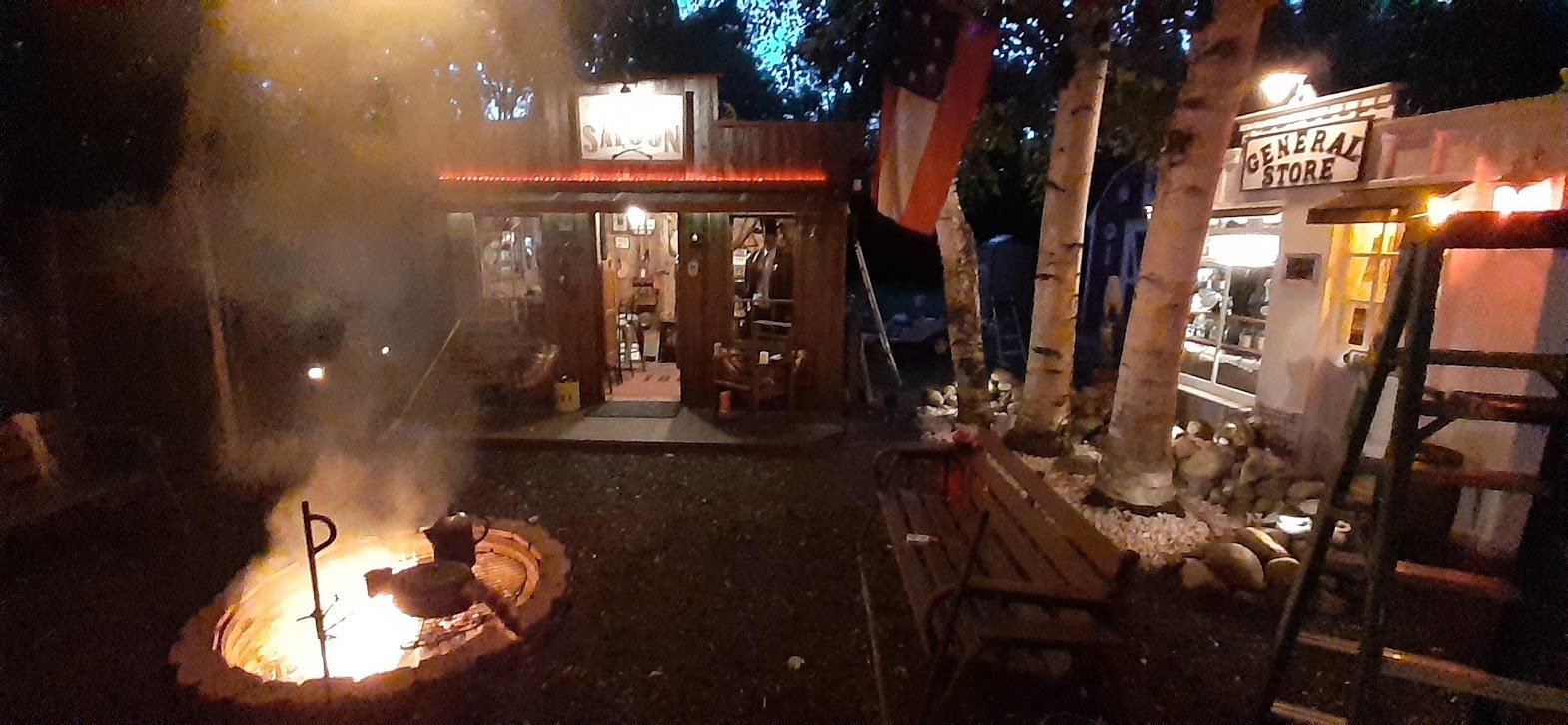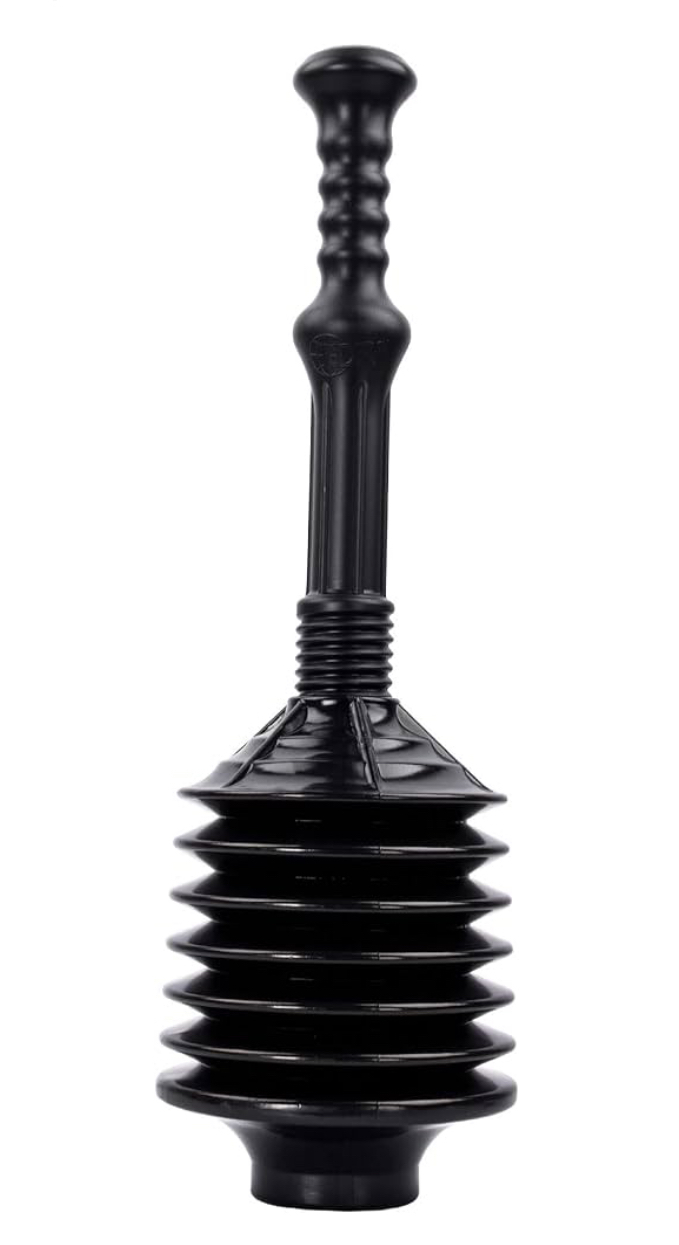I used sink plungers in toilets pretty much my whole life until i scrolled across a similar diagram one day and discovered the truth.
I use a bidet and that cuts down on TP usage, but sometimes you get a big ol’ honker of a log ploppin’ out and that sucker just says, “Not today.” That’s when the trusty turd wrangler is your best friend.
One time I was at my mother-in-laws and clogged that some bitch. I couldn’t find a plunger. Turns out my sister-in-law took it when she went away to college, because she was too scared to buy one. I tried to text my wife, but I had no service. So I left it there and went and told my wife. My mother-in-law took a golf cart to the neighbor’s house and explained the situation and they let her borrow theirs. Meanwhile, I’m fucking mortified that the neighbors now think I have fiber intake issues.
Always keep a plunger in a bathroom with a toilet.
Bidet is the way.
There’s a lot of intriguing family history in your story. SIL scared to buy a plunger. MIL took a golf cart. Interesting group.
Bro, that ain’t the half of it. My father-in-law built an entire western town in his backyard and when he was done he built a Jurassic Park with dinosaurs essentially made of trash. Here is a shitty picture of the saloon with a bar in it. I’ll see if I can find some of the dinosaur pics too.

Yes PLEASE!
Sounds like you married right.
The signs and storefronts are amazing.
I see the inside of the saloon, is the general store a whole room are just the storefront?
that is amazing, give him my maddest of props.
Here’s a video of Western World. https://youtu.be/ug2U5PUSwA4
Here’s another one of his annual go cart track. https://youtu.be/E5ljFgmQ0MQ
I’ll have to find the Jurassic Park videos.
his annual go-kart track…I knew I wanted land when I eventually buy a house, but I wasn’t sure what I wanted it for.
now I have a lot of valuable inspiration.
please pass on my sincere congratulations and respect, Western World and the go-karts are awesome.
And yes, I’m ready to see the trash dinosaurs.
Yeah just casually dropping in there that his dad sets up a go-cart track for the family get-together in the garden, sure.
Im appreciative he did, i need to know eccentric wackadoos that build scrap dinos and saloons are around.
I’m bored as shit at work.
I found them. There was a zip line through this area too.


Oh man!
I didn’t realize they were fully fleshed out dinosaurs!
they look great!
I actually saw some scrap dinosaurs in Arizona, but they’re still metal and skeleton, no skin or color on them.
wow and the skin is even pebbled. that is so cool.
thank you for getting back to me and sharing those pictures. wow! those are huge dinos too
Damn that’s some impressive stuff! :o
I love this so fucking much. Eccentric people are the best.
Also somebody please invite this old dude to play D&D
He would very much rather smoke cigarettes and drink Bud Light in the yard.
He can do all that but not have a toilet that gets clogged so frequently his daughter is stealing plungers out of anxiety?
I’m not even joking, they got divorced last week.
damn that’s cool
I’d love to read more of these stories, if you have time to share them. Maybe !casualconversation@lemm.ee?
Ok, I’ll join.
That’s what the poop knife is for.
I try to get out… BUT THEY KEEP PULLING ME BACK IN!
Proclaim the Gospel of W. C. Jesus!
This guy poop knifes
Thanks for this story. I read it while taking a shit
Hey I have this very specific problem whenever I use this thin-USE BIDETS, USE BIDETS OR YOU WILL REGRET IT FOREVER, IT USES LESS TOILET PAPER AND WHY AREN’T YOU USING THEM YET THEY’RE PERFECT AND GREAT AND…
How you sound right now.
Say that to my face. I fuggin’ dare you, dude.
Doesn’t surprise me that I’m talking to a literal mongoloid Neanderthal whose two neurons only have one function and that’s to bash against each other.
deleted by creator
And the bidet’s right there.
Good thinking.
Damn and my kitchen faucet comes with a “power wash” mode. I can’t wait to blast boiling hot water up my butthole. 🤤
It would literally have cost you nothing not to write that sentence down… but here we are
a blistering cleanse
And the sink strainer is there to save and repurpose the corn.
Sustainable living.
Which brings up a good point; why would anyone need a plunger for a sink? If it gets clogged, nothing will help you short of a drain snake. And if your kitchen sink is getting clogged, it’s time to invest in a garbage disposal.
Plungers certainly do help with sinks. Loosens up a partial clog easily in my experience.
Especially in combination with soda, vinegar and hot water.
Soda and vinegar is an odd combination. Soda is a base, making water alkali. Vinegar is an acid, making water acidic. Together, they make water neutral again, with a lot of pretty bubbles.
Either one can work really well depending on the stuff you need to get rid of. But adding one to the other just weakens it.
I do this for a living. If you really wanna save yourself some money, depending on your plumbing(usually PVC, older houses might have cast iron), just put a bit of a cleaning agent and run hot water into your drain for 10-20 minutes weekly. The hot water alone every week will do more for your pipes in the long run.
If you’re doing this regularly you won’t have to run the water as long, maybe 5 minutes weekly. This helps to dissolve build up from stuff like grease and soap scum which catches other food debris and leads to clogs. Preventive maintenance is best, spend a little time and money now to save a lot of time and money later.
Mixing them together causes an exothermic reaction that releases a lot of CO2. Both the heat and the releasing of gas bubbles can also help to break up things. Also it’s unlikely that all will mix with all, so you get some pockets of basic and some pockets of alkaline, who knows what you’re trying to break up but some of either might help. The method they learned is kind of throwing everything at it cus something will work. You aren’t wrong, both methods have validity
Hmm, it seems to me most of those bubbles will happen not where you need them. Maybe if you throw in the base first and the acid later (or the other way around)
And the exothermic reaction is really weak. Barely gets warm.
Mix in some red food coloring and you’ve got yourself a good time
Especially when it regurgitates back up in your other sink mixed with hair and grime
So weird. It always seems to pump air through the overflow and do no good. By the time you figure out how to plug the overflow, you might as well have taken off the trap and emptied it in the trash …… especially with PVC traps where it all just comes apart without tools
Many sinks do not have overflow drains.
I just put my hand over the hole, takes two seconds. And I don’t have to clear out under the sink and get a bucket. (And it’s only very rarely necessary)
I’ve found a plunger useful for a sink occasionally, a bit of back and forth plunging can loosen up a hairball or break a layer of fat/soap scum. On the other hand I’ve never needed to use a plunger on a toilet - I don’t know how much of this is exaggeration on the internet but Australian toilets don’t seem to have anywhere near the amount of issues the American designs do.
Babe quick, new toilet lore just dropped!
skibidi?
About 250 years old, thinking it’s new is why I wanted a YSK post.
yeah but I feel…
always had the left style ‘sink’ plungers growing up. they unclogged the shitter just fine.
Absolutely never, ever tried using a plunger on the sink. I guess our family didn’t clog the sinks so much? what’s clogging these sinks that they justify a plunger?
If you clean a fish and toss a couple scales, bones and fish skin down the sink, it will clog.
in the states, where houses have garbage disposals, I don’t think sink clogs are much of a problem anymore.
but most countries don’t have garbage disposals, and the original plunger design was invented 250 years ago, before much of modern plumbing and pipe design and everything, so it was useful to have any kind of plunger around.
you can make those couple plungers work for the toilet in a lot of situations, but for the toilet specifically a toilet. plunger is going to make your job way easier without any mess and splashing
yeah I have a disposal that will eat bones. never clogged the sink.
Was the og design for shitters or sinks?
Never had splash issues, I generally plunge pretty cautiously.
og was for drains in general at the time it was invented in the late 1700s, we didn’t even have flush toilets or anything more than cesspools, so there was no need to unclog blockages in household toilets.
The first one was wielded more like a hammer, so it really was just to knock shit loose from whatever hole it was in, apparently.
I definitely felt the same way about toilet plungers as you do until I used one.
until I… took the plunge?
Most plungers are both. Pull down the cone for the commode or push it up inside for the sink.
What kind of maniac uses it in a sink after using it in a toilet?
Clean it first. Then clean the sink after using soiled plumbing tools.
Just buy a new sink after you unclogged it.
y’all motherfluffers never heard of bleach
I have to finish Attack on titan first.
Who uses the same plunger for the toilet and kitchen sink?
I guess the kind that actually cleans the plunger after use. When I have to use one, after use, I take it outside and hose it off with the hose pipe then soak it in a bucket of bleach water.
I just rinse off the plunger in the new toilet water. Never had an issue.
Plus you can do a double check flush to make sure it’s all clear.
The sink is one of the easiest areas of your house to clean with soap and water.
I prefer not to put my hand on the business end of the doodie derby rod, thank you very much
Am I the only one who’s never used a plunger (and never needed to)?
You elfin anomaly.
Nope, same and never heard others talking about it in real life. I’m guessing there is some design issues in the American toilets that is not a problem in Europe. Or it’s the large portions of low quality food?
American plumbing is shit (pun intended) compared to Europe’s. Source: I lived in Germany for 10 years and never once needed a plunger, while I’ve needed them regularly in the US.
The comments do seem to hint at this being a big problem in the US.
Indeed, it was very noticeable to me when I moved back here and had to actually consider how much toilet paper there was before flushing. German toilets took whatever I put in there!
Even with the weird “shit shelf” toilets?
Yup, and I had shit shelf toilets pretty much the whole time since it was the 80s and 90s. They probably would have been harder to plunge, so good thing they never needed it!
I think it has to do with the fact that most European toilets put the reservoir up high either on or in the wall, and gravity helps blast the dook down the drain. I have one of those up high ones with the chain flush in my house (US), and that toilet never clogs.
Australia- never needed a plunger and unless your house is 70+ years old, the cistern and pan are always close coupled.
That said, for a Toilet the sewer connection is 100mm DWV and we use washdown toilets (as most of the world does) vs. American siphon toilets, which use an absolutely massive amount of water and a tiny little trapway to create a siphon that sucks the waste down - that tiny little trap is what gets clogged.
I think Americans would probably sooner move the Metric system than change to a better pan design.
Maybe, but none of the ones I used were chain flushers.
Are you American though? Here in the UK, nobody really owns a plunger and they don’t need to, the plumbing is different, it doesn’t clog. Do need to own a toilet brush though, to wipe off the skidmarks, which is more rare in the US.
It’s not just the UK that nobody needs a plunger, it’s every modern country except the US. Their plumbing is a century out of date and they eat ultra-processed junk
A recipe for dis-ass-ter
It’s kinda weird that the country where everything is MOOOAR they don’t have gigantic shit pipes
Plungers are extremely common in germany. To be precise i can’t remember ever being in a bathroom without one.
Yeah that’s why I specified modern countries, Klaus 😂
I am not, so I guess that explains it. Thanks!
Some us don’t poop in the woods every day.
Of course you are. Every other human on the planet is issued a plunger at birth. What’s wrong with you?
Eat more fiber.
Ok but where’s the poop knife?
Where else?
on the poop knife peg.
The ol pkp.
Which raises the question of what the difference is between the sink poop knife and the toilet poop knife?
sink poop knife
:|
:\
My new toilet doesn’t fit either of the above shapes, but a “Beehive” plunger works great.
https://www.korky.com/parts/plungers/beehive-max-toilet-plunger
The toilet also flushed really well and hasn’t gotten plugged up even once yet, but I made sure to have one that would work as soon as the toilet was ready to use.
What’s different between the beehive flange and the toilet plunger flange? they look the same.
or perhaps I should ask what shape is your toilet?
(USA) - I had the same issue as the user above due to a high efficiency toilet. The opening is more rectangular/ elongated than a normal toilet’s circular opening.
I now just imagine them having a hexagonal toilet.
Hahaha, this must be it.
Here’s the toilet, though the pics aren’t helpful.
https://www.build.com/product/summary/618486
The exit hole is recessed backwards and squareish, with a wide channel. The flange doesn’t sit properly inside it, and the circumference of the bell is too small. With the beehive the circumference is wider, and it just sort of smothers the whole area, and pumps the water through its center hole, which has nowhere to go but into the exit. Like, it’s not anything precise, it would probably work great in a “normal” toilet just as well because it just fills whatever space there is.
Why did a regular one not fit?
Basically, it’s shaped weird and won’t make a seal. It’s a WaterSense toilet that flushes very efficiently with 1.28 gallons, with an unusual configuration of input/output under the water. Almost like a channel from front(ish) to back. If you try to use a plunger like those pictured, part of the channel isn’t covered, so you just push water back out into the bowl. Good thing I was trying it with a clean new toilet! The wide deep beehive shape lays rubber all into the space, pushing the water down into the exit hole.
Why has no one mentioned this style? I’ve had one for years, and there’s never been a clog it couldn’t fix.

They’re too Giger.
the regular toilet plungers also have a flange and work every time without implanting xenomorphs in your chest cavity.
I agree, although the plastic will crack /split along one of the folds eventually, rendering it unusable
Still, that style is my goto

They sell these in dollar stores here.
I didn’t have to unclog a sink for years and didn’t own a plunger. I was looking for a “classic one” but they only had these and I wasn’t sure. I gave it a try anyway and to my surprise, it was very efficient.
Never tried on a toilet and I suspect it would work fine too, but I tried it on my bathtub drain and unfortunately it fails to make a seal.
Why do you have a man-portable Tesla Coil as a plunger?
That’s totally a sex toy.
Wait…that’s a flange? I always thought those were just pulled out by accident, like turned inside out. I also always just ignored it because it never hinders anything.
Think about where the splashy toilet water goes when they’re flipped up inside the plunger. They’re shipped that way to cut down on carton space though.
Yes, that makes sense. TIL.
Yup, that’s a flange, designed for toilet drains
Instructions unclear, plunger stuck on the ceiling, shit water all over my feet and on the walls.
No, you got it.
That all sounds correct.
plunger room of death
A manual auger works even better and doesn’t splash
manual auger
This is just code for ‘poop knife’, right?
Poop drill.
I mean, it basically is a poop knife that can reach further down inside the toilet.
Or start using the shower instead, and stomp it through the grate.
wafflestomp
The toilet plunger doesn’t splash, but toilet augers whip back and forth while you crank them, causing splashing, plus scrape up the toilet bowl.
Augers are way more work than a toilet plunger.
Yeah, but getting it past the s trap is a pain. A plunger works for 90% of clogs.
Every home should have an auger, but a plunger will work quicker, easier, and cleaner, 99 out of 100 times.
Yeah, I’ve had to help a neighbor with that 1 time out of 100. The plunger was just causing the water to slam against the turd that had created a perfect seal and splash back outside the toilet. It probably took at least 5 uses with the auger to finally clear out enough crap to finally break it apart enough to let it flush.
Fortunately, the second time I helped them with a nearly identical situation, the plunger worked. But it still took a few forceful plunges in quick succession. I was worried I might have to use the auger again.
The Sink plunger is more versetile.
Some sink plungers have a collapsible flange hidden inside
I also enjoy touching the inside of a plunger
Call me crazy but I wear gloves when cleaning toilets
Not gonna say that I always grab some gloves before I plunge away my horror.
But I DO wash the ever loving hell out of that plunger after every use. I still prefer dedicated toilet (poo) and sink (gunk) plunger because obvious reasons, but in a pinch?
I wash my hands afterwards.
That’s a toilet plunger. Exactly. Sink plungers have no flange. :)
Howww so?
Like as a training sword?
Soup bowl for feeding tall people
I do love a good swordfight.
If the flange is not collapseble it can’t be used in sink.
Growing up my mom didn’t understand this and always insisted that the sink plungers were the only kind that worked (she also called them toilet plungers) and that toilet plungers (the fancy kind) were some kind of trick. Took until I was in college that I learned you shouldn’t have to break a sweat unclogging your toilet.
I strongly identify with this story.
Here’s the second iteration of the OG patent.
Originally the simply device on the left was the one plunger to rule them all. It works in sinks and toilets. The flange and the concept of a toilet-specific plunger was a later concept.
Yup, started with the cup and derived into the flange.
Thanks for linking the US patent!
This is wrong. Some toilets use the normal “sink” plunger because the exit opening is too large for the “toilet” marked style. You get either or whatever fits your toilet. It’s not specifically for sink only.
Not at all.
“You get either or whatever fits your toilet. It’s not specifically for sink only.”
Incorrect.
The cup plunger is designed to fit over drains on flat surfaces, while flanged plungers are designed to fit inside the outtake valves of toilets.
“Some toilets use the normal “sink” plunger because the exit opening is too large for the “toilet” marked style”.
This is also wrong because:
- The flange is as wide as a cup plunger for sinks anyway, so a sink plunger won’t work if a toilet outtake is too wide for a toilet plunger, and
- the toilet plunger is made to fit inside the outtake of the toilet, not over the mouth of the drain like a cup plunger.
they are completely different designs and have different use-cases that you will only give you and others more trouble and mess for by not knowing and spreading misinformation.
I am not wrong. There are toilet designs where the flange style literally doesn’t cover the exit chute. I have one. I have to use a “sink” style type. The flange style is small and does not form any type of seal due to the shape and size. It’s literally impossible that it is the correct solution. Everything I said is 100% correct.
you are wrong.
“There are toilet designs where the flange style literally doesn’t cover the exit chute.”
The flange is not designed to cover the exit chute, but rather to fit inside the outtake.
This is also apparently due to your specifically atypical plunger.
“The flange style is small and does not form any type of seal due to the shape and size”
since flange and cup plungers are the same diameter, you are clearly having an anomalous problem that you should not be drawing broad conclusions from.
cup plungers and flange plungers are specifically designed to address different problems, to be used in different manners(the cup covers a uniform drain on a flat surface while the flange creates a seal within the sloped and curved toilet outtake by fitting inside the outtake) and are not interchangeable.
Your premises are flawed and your conclusions are incorrect.
Literally don’t give a shit what you say. I am not wrong. On this specific toilet, the flange style literally doesn’t seal and CANNOT perform a push / pull to unclog a drain due to the exit profile and shaping.
You are not right no matter how smart you think you are.
You are arguing that a baseball cap works equally as well as putting a sneaker on your head.
It doesn’t, because while a sneaker is designed and meant to cover your foot, a baseball cap is designed and intended to cover your head.
A sneaker makes an ineffective ballcap and a ballcap makes an ineffective shoe.
Two separate items with separate designs and use-cases.
I think you are failing to understand the design / curvature / multiple radius features of the exit point and that the flange style literally cannot form any remotely close to passable seal to do its job. Idk what to tell you but your not right no matter how you think you can phrase it.
no, i got it.
no worries.


























